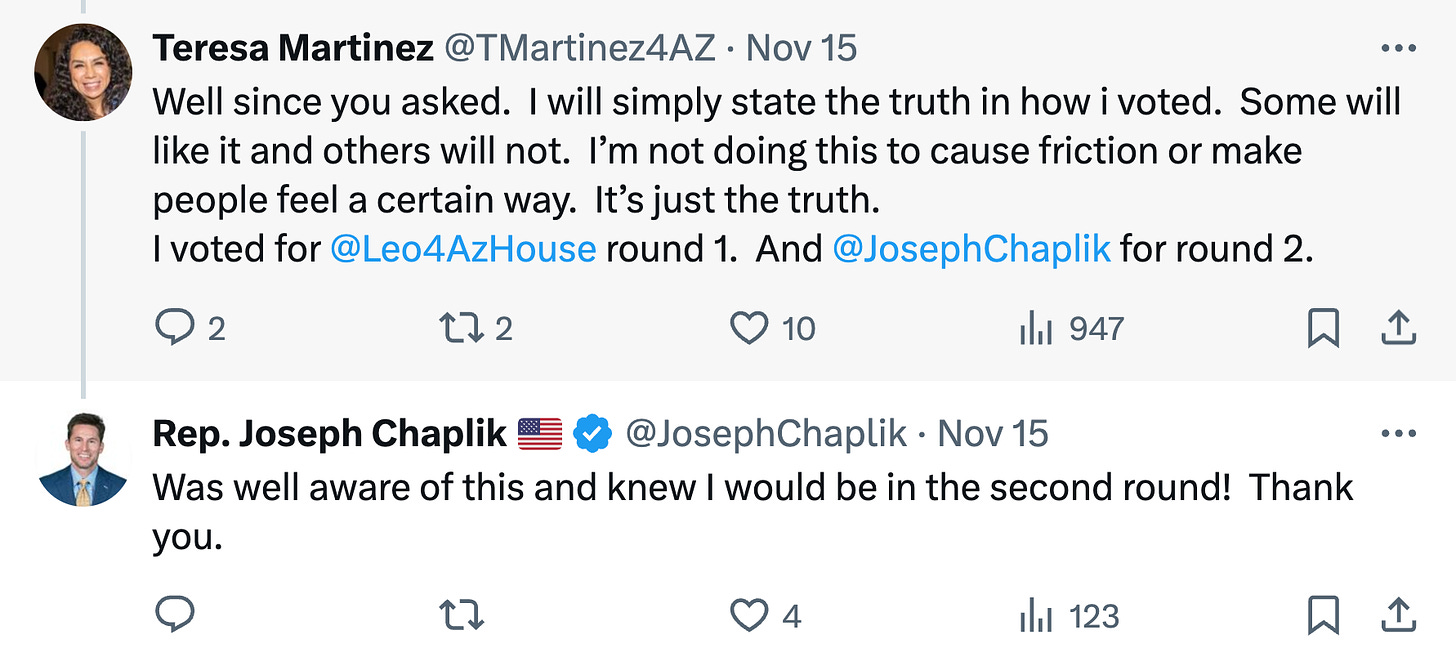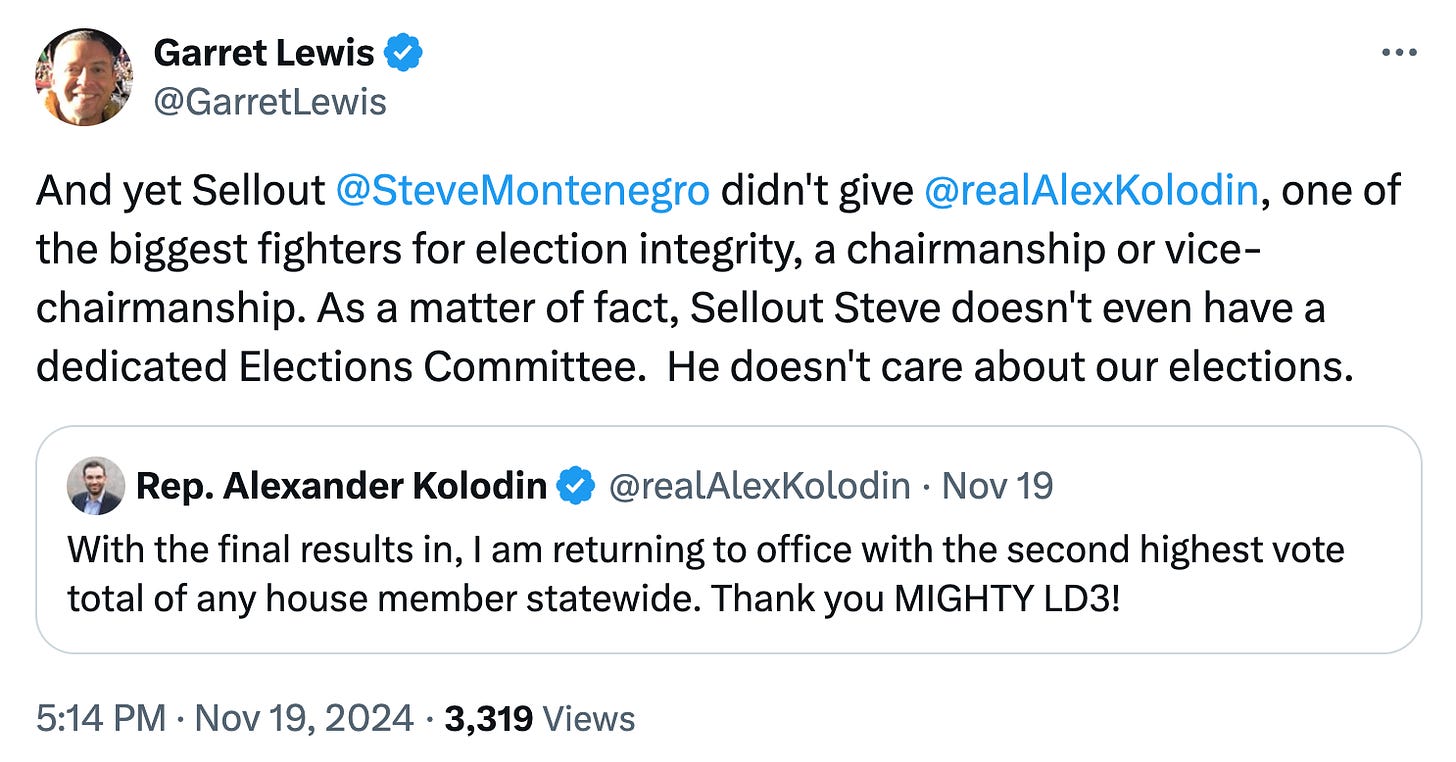The new gatekeepers
House Freedom Caucus snubbed … Senate GOP peace accord … And fundraising from a position of strength.
The state House speaker and Senate president picked the Capitol’s committee chairmen this week.
Committee chairmen are the ultimate gatekeepers over their specific policy domain. They have the power to singlehandedly kill any bill assigned to their committee, no matter how much broad-based support the idea may have.1
If, for example, you’re hoping Arizona will make drastic reforms to the way it protects water, you’re going to be disappointed to hear that Republican Rep. Gail Griffin, a longtime opponent of stricter environmental protections, was once again named chair of the Natural Resources, Energy & Water Committee.
Personally, we’re not thrilled to see that Republican Sen. Jake Hoffman — who has killed three versions of our bill to create a Capitol monument honoring assassinated journalist Don Bolles in the last two years by never giving the bills a hearing — was once again awarded chairmanship of the Senate Government Committee, which deals with those kinds of bills.
That’s why committee chairmen matter…

See the list of House committees and chairmen here.
See the list of Senate committees and chairmen here.
As we noted in our primer to the 2024 legislative session, the speaker and president generally assign bills to committees based on the topic, and committee chairs decide whether to hear the bills. Bills rarely die because lawmakers vote them down. Instead, most bills die a quiet death when a committee chairman refuses to give them a hearing.
After each election, the new speaker and president decide which committees to create,2 and which of their fellow Republicans to put in charge of those committees.
That post-election ritual of creating committees, assigning chairmanship and assembling the members establishes the legislative pecking order for the next two years.
Who gets picked to lead and serve on which committees (and who doesn’t) can tell you a lot about the personal and political dynamics within the Republican caucus.
For example, after challenging Republican Steve Montenegro for the House speakership, Freedom Caucus leader Joseph Chaplik and several of his followers — like Reps. Alexander Kolodin and Teresa Martinez — found themselves without a committee to chair, vastly reducing their ability to set the agenda at the Capitol or even ensure their own bills get a hearing.
The committee-setting process can also indicate what lawmakers expect to emphasize in the upcoming session and what kind of policies might be coming down the pipeline.
For example, the House Municipal Oversight & Elections Committee will morph into the Federalism, Military Affairs & Elections Committee to emphasize the interests and focus of its new chairman, Republican Rep. John Gillette.
Committee chairmanships are generally awarded based on three factors: Seniority, expertise and favoritism.
Favoritism is, obviously, the most important factor.
Coveted committee chairmanships almost always go to the close allies of the new speaker and presidents — namely, the lawmakers who supported their campaigns for speaker or president.
Those who support a losing candidate for president or speaker rarely land chairmanships of the more influential and prestigious committees. Instead, they’re often relegated to back-bench committees or denied committee chairmanships altogether.
Senate President Warren Petersen was unanimously reelected to the position this year, and he rewarded every Republican who won reelection with a committee chairmanship.3
In the House, Montenegro was elected to the speakership by a slim majority of his caucus, and committee chairs were mostly reserved for his allies. Not every returning lawmaker got a committee to chair, and many members of the Freedom Caucus, specifically, appear singled out as a punishment for opposing him.
Seniority
Seniority also matters, and it’s rare for committee chairmanships to go to freshman lawmakers.
But there are exceptions, like freshman Sen.-elect Carine Werner taking the reins as chair of the Senate Health & Human Services Committee, although only medical experience is arguing against COVID restrictions in school sports during the pandemic.
MAGA Republican Mark Finchem and the more business-backed Vince Leach both returned to the Capitol this year after skipping a term. But Finchem was awarded a chairmanship of the Federalism Committee and the powerful Joint Legislative Audit Committee, while Leach got nothing.
And two Republicans joined the Senate from the House, Tim Dunn and Kevin Payne. But only Payne got a committee to chair.
Experience
Sometimes, House and Senate leaders will create entirely new committees to fit their members’ skills, interests or expertise.
This year, the House will host a brand-new Science & Technology Committee, chaired by Republican Rep. Beverly Pingerelli, who has a background in genetic sciences, for example.
During former Republican Rep. Tony Rivero’s first stint at the Capitol, the former city council member and international business consultant established and chaired the Local & International Affairs Committee. When he left the Capitol in 2020, that committee disappeared. Now that he’s back,4 the House created an International Trade Committee just for him.5
And committees aren’t just created to suit the careers of lawmakers. They also used to help boost lawmakers’ careers.
The first Senate Elections Committee was started in 2013 to boost the résumé of then-Sen. Michele Reagan before her run for the Secretary of State’s Office the next year. The House created one shortly after to appease then-Rep. Michelle Ugenti-Rita, who later ran for secretary of state herself.
Shuffling the deck
The biennial exercise of renaming the House and Senate committees tells us a lot about what lawmakers expect to focus on in the upcoming session.
Twenty years ago, the Legislature had a Universities, Community Colleges & Technology Committee. Then it morphed into the Higher Education Committee. Then it became the Higher Education & Workforce Committee. As focus drifted, lawmakers eliminated it entirely.
Sometimes the changes are seemingly small. The House Military Affairs & Public Safety Committee was renamed this year as the Public Safety & Law Enforcement Committee.
But sometimes seemingly small changes can mean big shifts in the power dynamics.
This year, Petersen combined the Senate Elections Committee and the Senate Judiciary Committee into one superpowered committee chaired by Republican Sen. Wendy Rogers.
That’s a huge expansion of Rogers’ influence, considering the Judiciary Committee is among the most powerful and active committees at the Capitol. Instead of just deciding which election-related bills get a hearing, Rogers will now control the flow of any piece of legislation that affects Arizona’s criminal code.
The former Senate Finance & Commerce Committee dealt with business issues, allowing the chairman to become a fundraising juggernaut.
This year, it was split into two committees, setting up Republican Sens. JD Mesnard and Shawnna Bolick, who both represent competitive districts, with access to the flow of campaign donations from lobbyists that accompany the title of chairman.
Speaking of fundraising… If you made it this far, maybe today’s the day you click that button.
Stacking the decks
While the committee chairmen hold most of the agenda-setting power, the overall makeup of the committees can also tell us how much division Republicans expect in a given policy area.
And the House speaker and Senate president can stack the committees with enough Republicans to ensure that no one dissenter can stop the Republican agenda.
Most of the committees in the Senate contain four Republicans and three Democrats, meaning a single Republican could join with Democrats to form a majority and pass legislation.
But a few — like the budget-building Appropriations Committee — are stacked with five or six Republicans, meaning one Republican can join with Democrats to stop legislation, but not to pass it.
Stacking the committees also means that Republicans are generally busier than Democrats.
In the Senate,6 Republicans generally have four committee assignments, including chairmanships and vice-chairmanships.
Democrats are assigned to three committees at most, and none are awarded chairmanships or positions as vice-chairman.
As with most legislative rules, there are a few exceptions to that rule.
There are two main types of committees: statutory committees, and standing committees. Standing committees are generally the ones that deal with legislation — they’re grouped by policy subject and the names can change year by year. Statutory committees are the handful of big-picture committees, like the Joint Legislative Budget Committee and the Joint Legislative Audit Committee, which are required by Arizona law. They generally don’t hear bills and they meet less frequently. You can see the Senate statutory committee list here. The House hasn’t released its list yet.
We’re excluding a few members of Petersen’s leadership team who aren’t chairmen, which is pretty standard since those positions come with additional responsibilities.
Four Republicans are returning to the House this year after a break, and they all got committees to chair. The eight “true freshmen” Republicans in the House were all set up with vice-chairmanships.
Rivero’s committee is among the most coveted by lawmakers on both sides of the aisle — not because it gets important bills, but because members of the committee are frequently invited on international junkets by lobbying groups.
The House has only released the names of committee chairmen and vice-chairmen so far, not the full list of committee members.









No wonder we can't have nice things.
This was a really concise explanation of how AZ's legislature works....And it's why we can't have the things that Arizonans want. The Rs are the gatekeepers.
Thanks for the LOL about Carine Werner's experience to chair the Senate Health & Human Services Committee. That says it all.